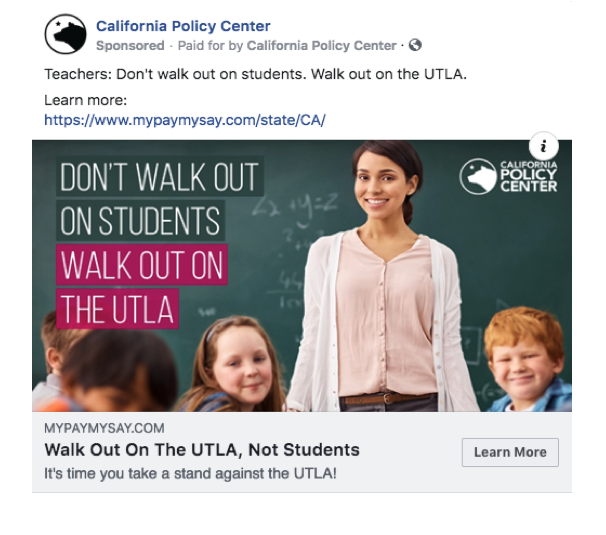Membership in California’s government unions plummeted in 2018, federal report shows
 “Walk out on the union, not the kids”: A California Policy Center social media advertisement delivered during the Los Angeles teachers strike.
“Walk out on the union, not the kids”: A California Policy Center social media advertisement delivered during the Los Angeles teachers strike.
Memo to anyone still wondering about the impact of the Supreme Court’s landmark 2018 decision in Janus v AFSCME: Wonder no more.
Despite a surging economy, union membership in California dropped by 86,000 last year, the most dramatic decline in the nation, the federal Bureau of Labor Statistics reports.
The 3.45% decline in California’s union membership came even as the state’s employment growth surged 2%. Taken together, the net rate of union membership dropped by more than 5%.
In the days following the Court’s June 27 Janus decision, California state agencies prohibited automatic paycheck deductions for some 41,000 government employees. California Policy Center (CPC) predicted it could help about 63,770 other government workers, all of them dues-paying members, to resign from their unions post-Janus. That projection proved too conservative by about 35%, the BLS report shows.
“This massive drop in union membership reveals the power of California Policy Center’s government employee messaging effort,” said CPC founder and CEO Mark Bucher.
From June 27 until December 31, CPC and its partner, Michigan’s Mackinac Center for Public Policy, delivered 13.9 million advertisements to the social media and email accounts of California’s 1.4 million public employees. That campaign directed public employees to MyPayMySay.com, a website designed to educate government workers about their rights under Janus.
“In addition to those millions of ads, we’ve worked directly – person-to-person, one-on-one – to assist thousands in opting out of their unions,” he said. “It’s expensive and labor-intensive, but the Bureau of Labor Statistics report shows it’s working far better than we expected.”
The BLS report shows that California’s decline offset modest union growth in other parts of the country. “In the country as a whole, union membership dropped by 59,000,” Bucher said. “So California’s 86,000 decline accounts for all of the drop in union membership nationwide, and then some.”
“These numbers show there’s a significant appetite among California public employees, including teachers, to leave unions that aren’t serving them well,” said Mike Reitz, executive vice president of the Mackinac Center. “This is a surprisingly strong start, and it’s just the beginning.”
In Michigan, Reitz notes, membership in government unions dropped less than 1% in 2013, the first full year after Michigan Gov. Rick Snyder approved a law eliminating mandatory union membership for public employees. “After the first year following Michigan’s passage of right-to-work, unions bragged of losing only a few members and predicted that to be the final case,” said Reitz. “However, since then, Michigan’s largest public sector unions have lost a massive amount of members and revenue. The Michigan Education Association is down 32,000 members, or nearly 33 percent since its peak when the right-to-work law went into effect.”
If the Michigan example is a guide, the loss of union members in California may ultimately hobble the political ambitions of the powerful government unions that largely control state politics. One union official spoke candidly about the challenge confronting government union leaders.
“If we have less money as labor, we’re going to be spending less money on Democratic candidates, we’re going to be spending less money on things like ballot initiatives,” said Jessica Ulstad, a political field director for the California Federation of Teachers.
That outcome should delight Californians of all political stripes, Bucher said.
“Until Janus, California’s government unions could force public servants to pay the unions,” he said. “That coercion allowed union leaders to collect $2.7 million per day – about $1 billion per year. No other political player in the state even comes close, and that makes our union leaders the unelected rulers of California.”
Ultimately, Bucher said, workers themselves benefit – and not just because opting out of a union saves the average government worker $800 each year.
“Deprived of the ability to force public employees to pay the union in exchange for their jobs, union leaders will either find new ways to win the loyalty of their customers or they’ll go out of business.”
In addition to its MyPayMySay campaign, the California Policy Center has worked with other organizations to sue on behalf of workers deprived of their right to resign union membership, erected billboards in key locations during the Los Angeles teachers strike, and is canvassing in San Diego.
To learn how you can contribute to this effort, email Koppany@calpolicycenter.org.
